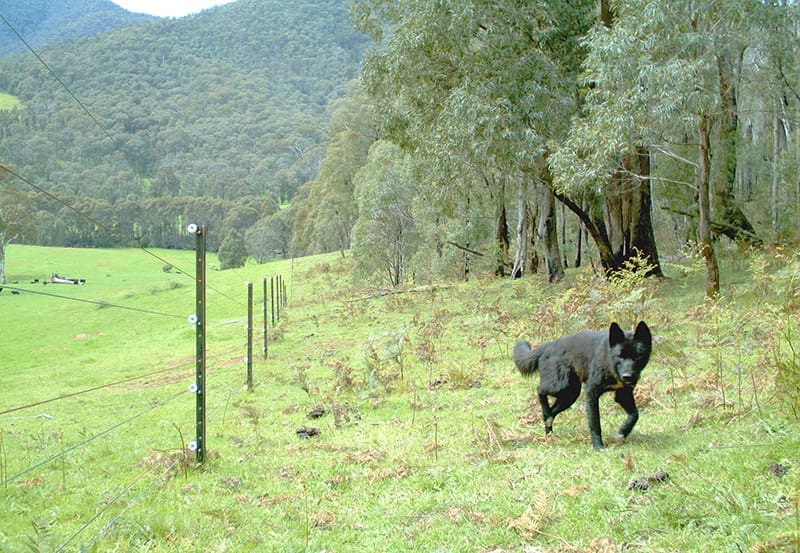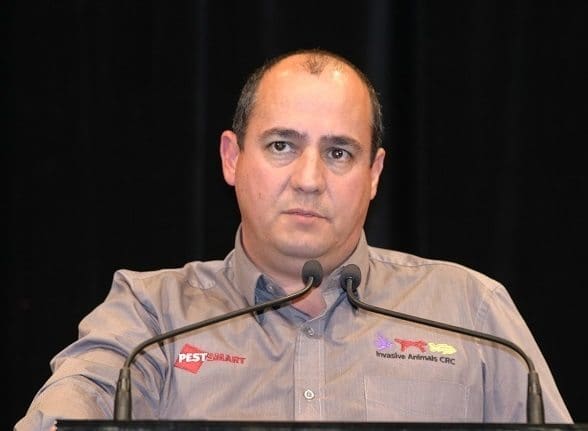THE future of wild dog control is front of mind for sheep and cattle producers in Victoria, as they await detail on how the Victorian government will conduct its review process on the state’s wild dog regulatory arrangements over the coming months.
Of key concern is the fate of the dingo unprotection order, which has been in place for several years and is a cornerstone of Victoria’s successful wild dog control legislation. It declares the dingo to be unprotected wildlife on all private land and on public land within 3km of a private land boundary in specified areas of the state. In October 2023, the order was extended for 12 months by the Victorian government to allow for its review.
Greg Mifsud, the National Wild Dog Management Coordinator at the Centre for Invasive Species Solutions and ecologist, said he was pleased that an extension to the unprotection order had been granted.
“It was a relief for Victorian producers, as the unprotection order is an important measure in helping to reduce wild dog predation on livestock,” said Mr Mifsud.
“Wild dogs in Australia are estimated to have an economic impact between $64 million to $111 million annually and cause a substantial emotional toll on producers who deal with the grisly aftermath of dog attacks on their livestock. Then there’s the impacts wild dogs have on native wildlife, with some populations driven to the brink of extinction.
“Whilst we acknowledge the environmental and cultural significance of the dingo, legislative mechanisms like the unprotection order are critical to ensure livestock, wildlife and domestic pets are protected. For industry, it’s not about eradication of dingoes, it’s about control. We simply want to manage their numbers to reduce their impacts on livestock and our biodiversity, and we’re very open to working with governments, First Nations peoples, producers and researchers to find that balance.”
Mr Mifsud advised that the National Wild Dog Action Plan Coordination Committee had written to the Victorian government to seek clarity on the review process and to offer their support to ensure the review process was robust and evidence based.
“Any change to the wild dog management program could have severe implications on livestock producers so it’s extremely important that industry know how they can participate in the review process, because if this review finds that dingoes need to be protected across the entire state, it means that basically no one can undertake control of wild dogs and dingoes,” he said.
“The National Wild Dog Action Plan Coordination Committee hope to work closely with the Victorian government during the review process to ensure they have access to reliable information about wild dog control. We have several members with an extensive research background in wild dog and dingo ecology and management, such as Associate Professor Ben Allen who co-chairs the International Union for Conservation of Nature’s dingo working group and Dr Peter Fleming, who has over 40 years of experience researching these animals.
“Much of the publicly available information on wild dogs is emotionally driven and highly contested, and many popular views about wild dogs are not supported by strong evidence. For example, dingo conservation groups claim that dingoes are persecuted across the entire state and that there is some risk of them being driven to extinction. However, the Victorian Wild Dog Program only operates in 1.60 million of the 4.7 million hectares of public lands in the east and north-west of the state. This provides over 3.1 million hectares of public lands including state forest and national park where dingoes are free from lethal control.”
“In addition, the use of non-lethal tools suggested by these conservation groups would see wild dogs pushed further across the state, allowing them to become established in bushland, state forests and national parks across Victoria. This would have serious implications for Victoria’s wildlife and the economy, putting at risk the state’s $4.5 billion sheep and wool industry and the 9,200 jobs that it provides for rural Victorian residents.”
Paul Diamond, a Victorian primary producer and co-founder of AirAgri, deals with wild dog attacks on his sheep regularly. He said changes to wild dog control in Victoria could see him lose 30-40 more sheep each week.
“I became a farmer because I enjoy working with animals every day. As a producer, I have an obligation to look after my livestock and to take measures to ensure they don’t get sick. However, if wild dog control in Victoria changes, I’ll have to stand by and let my animals get brutally attacked by wild dogs,” said Mr Diamond.
“It doesn’t make sense to me that animal activist groups advocating for changes to wild dog control aren’t considering the welfare impacts these changes would have on cattle and sheep, who will be slaughtered by wild dogs.
“To let so-called dingoes run loose without conservative lethal control options will impact Victorian livestock producers astronomically, in terms of productivity and the emotional turmoil they’ll experience having to let their animals die.”
Source: National Wild Dog Action Plan


